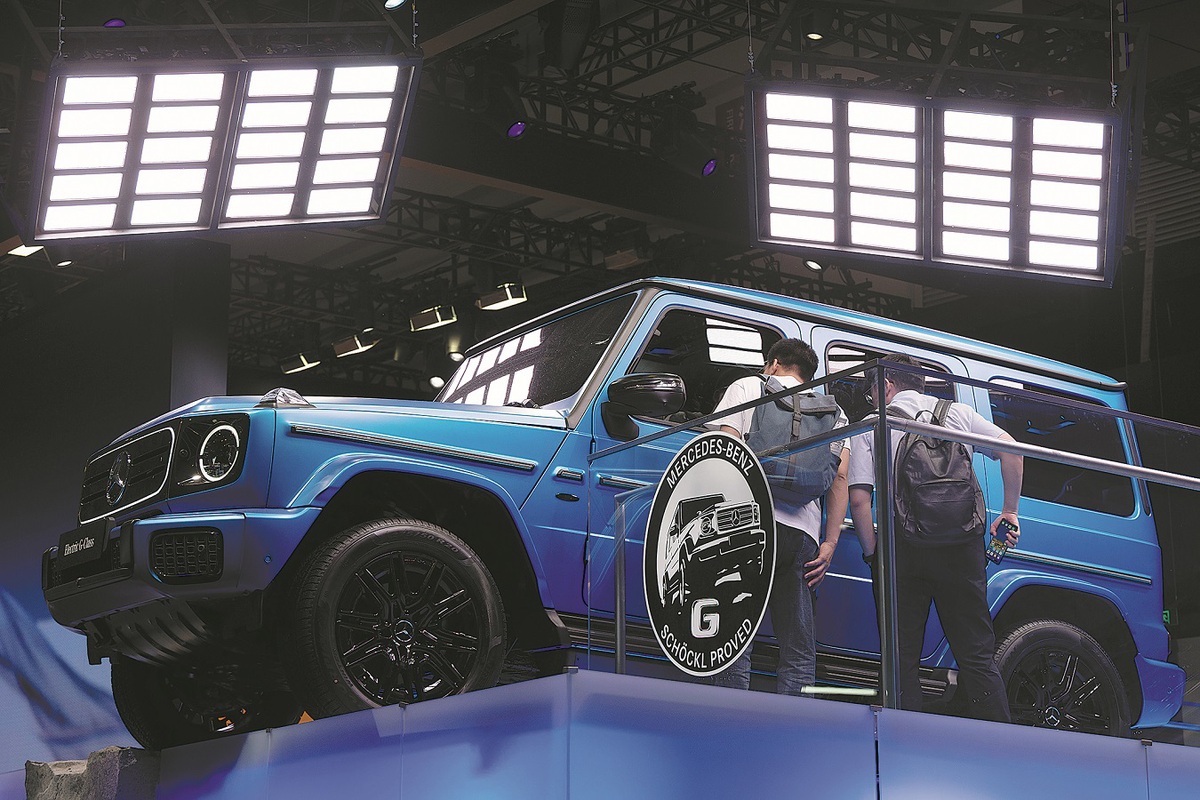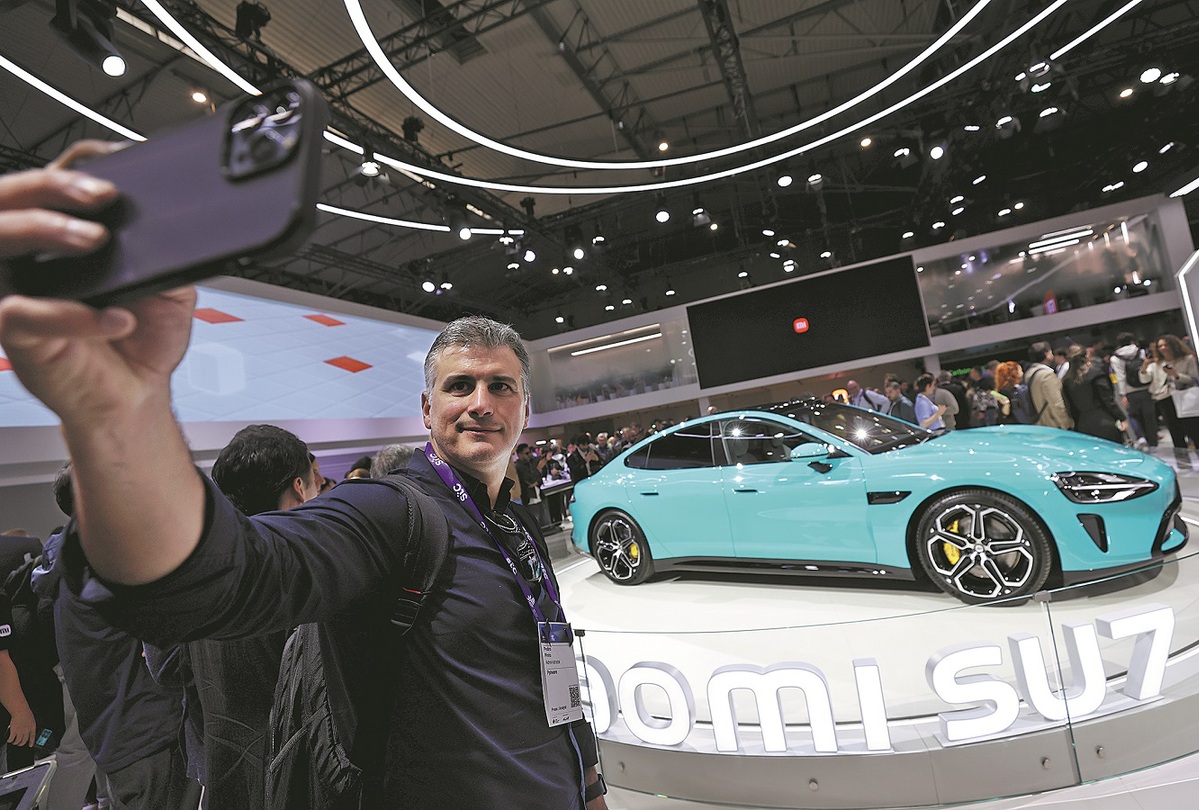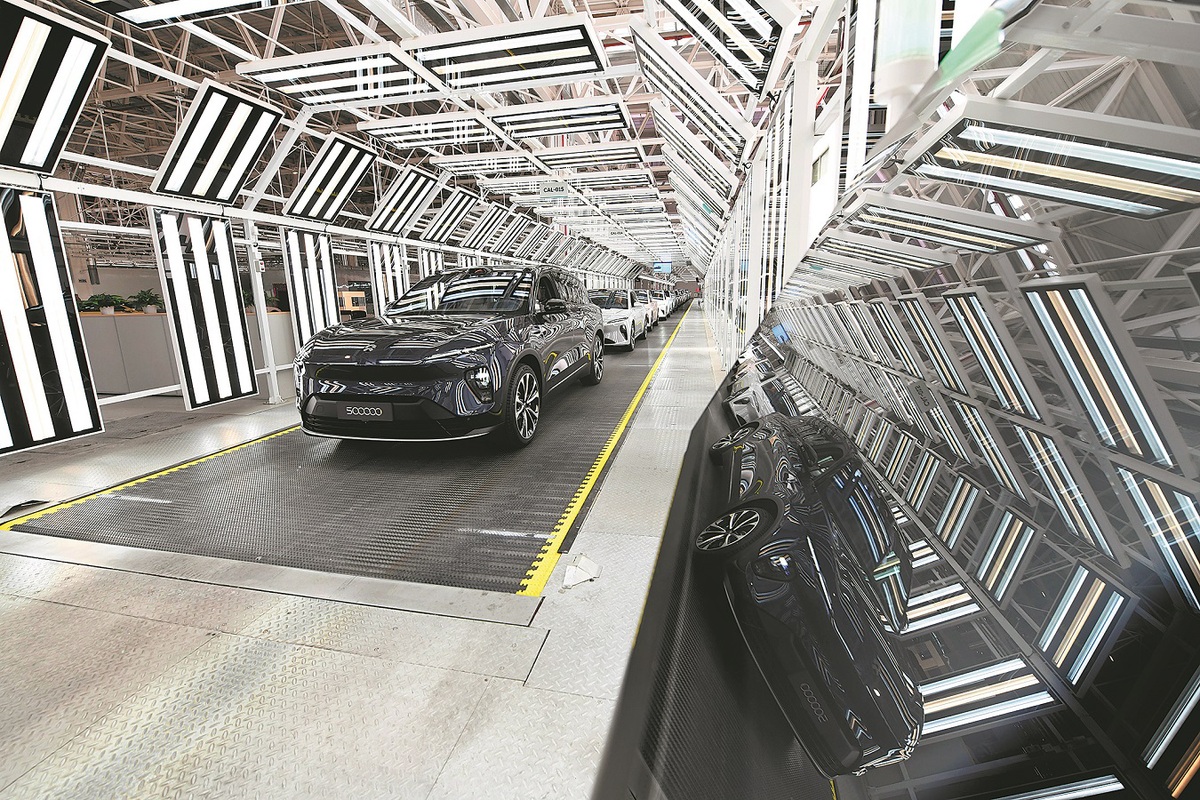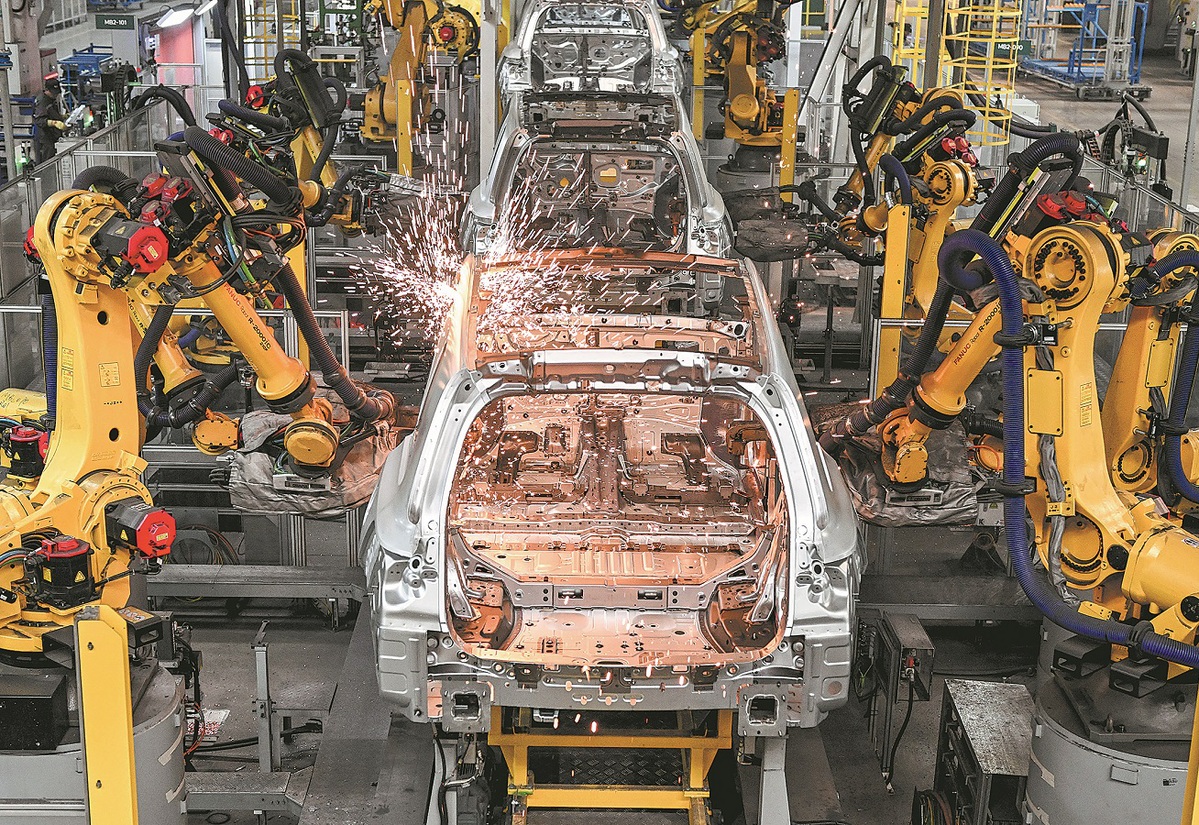Cellphone maker Xiaomi has EV market buzzing

Visitors look at a Mercedes-Benz at the 2024 Beijing International Automotive Exhibition in April. CHINA DAILY
As the newest Chinese electric vehicle maker, Xiaomi Corp has generated a buzz rarely seen in the history of the country's automotive sector, with both huge excitement and some controversy.
The launch in late March of its first model, the SU7 sports sedan, attracted more than 40 million views on Sina Weibo, online exposure other carmakers only dream about achieving.
Weeks before the event, guessing the sedan's price range had been a trending topic on China's social media platforms.
The curiosity is understandable. The model is the first vehicle from any big phone manufacturer — Apple has canceled its car-making plans and Huawei insists that it does not make vehicles, although it sells smart driving solutions.
The venture also has an aura of mystery. Xiaomi's CEO Lei Jun called the car project his final entrepreneurial venture, and the crowning of his extremely successful business career.
At an event three months ahead of the model's launch, Lei promised it would be a "dream car" to rival Tesla and Porsche.
Though priced at around one-fourth of Porsche's electric Taycan, which it resembles, the SU7, with the base model retailing for 215,900 yuan ($29,840), does have some eye-catching features. These include good acceleration, a minimum range of 700 kilometers, as well as an operating system that allows other Xiaomi products to work seamlessly with the car.

A visitor takes a selfie with Xiaomi's SU7 displayed at the Mobile World Congress 2024 in Barcelona, Spain, in February. GAO JING/XINHUA
Master marketer
But the excitement around the project would not have been possible without Lei, a marketing master who knows full well the power of social media.
Lei has verbal skills rarely displayed by other high-profile business leaders in China. Both Zhou Hongyi, CEO of network security company 360, and Liu Qiangdong, founder and chairman of online shopping giant JD, admit they cannot rival Lei when it comes to delivering a message.
In one of his videos posted on Sina Weibo ahead of the model's launch, Lei showcases the plant's paint workshop, saying: "Isn't it beautiful, our mirror-like paint finish?"
Such videos usually have millions of views on Sina Weibo, where Lei has more than 20 million followers.
Getting a thumbs-up for the post has little to do with the actual painting process, but the video is clever enough to allow potential buyers the rare opportunity of seeing inside a paint workshop.
Such good impressions give Xiaomi an advantage over its rivals when it comes to potential car buyers.
The SU7's features, coupled with Lei's marketing skills, have driven strong early demand for the model. Xiaomi said it received over 88,000 orders with a deposit of 5,000 yuan, within 24 hours of the launch.
In late April, Lei said at the company's shareholder meeting that the model's fully paid orders numbered over 70,000, and the company's goal is to deliver 100,000 units this year. In the first full sales month of April, 7,058 units were delivered. It was a decent number, allowing Xiaomi to outperform electric vehicle makers Avatr and Voyah, both of which were established in 2018.
Xiaomi's sales fell just 2,300 units short of competitor Xpeng's deliveries in April. Known for its edge in smart driving, Xpeng has six models in the market and has been chosen by Volkswagen to codevelop vehicles.

Chinese EV maker Nio's 500,000th vehicle rolls off the production line in Hefei, Anhui province, on May 9. ZHANG DUAN/XINHUA
Teething problems
However, the SU7 has encountered some teething problems as well as criticism.
One viral video showed a vehicle breaking down within minutes of it being delivered to its owner in Fujian province. Another showed a vehicle in Hunan province suffering brake failure after one month's use, which Xiaomi put down to a rare "software misdirection" that had been solved.
Such problems happen with other brands, but analysts said they could cool customers' enthusiasm for the SU7 as many of those first-time vehicle buyers are longtime customers of Xiaomi products.
The company's efforts to highlight differences between the SU7 and its competitors could also backfire, critics said. At the launch event, Lei gave a detailed list comparing the SU7 with Tesla's Model 3, a practice which is not an industry norm.
He expounded on what he called "novelties" to show Xiaomi's consideration for its customers, such as space for an umbrella, and a phone holder to aid navigation. However, many of Xiaomi's rivals do not see the need for a phone holder as navigation functions are integrated into the central display unit of their vehicles.
Despite this, Lei gave little information about the performance areas where the model was said to excel, such as smart driving, although he declared Xiaomi would be among the "top-class players".
"You don't declare so easily you are far ahead of others, do you? You should wait until it is a fact," said Li Shufu, chairman of the automotive company Geely Holding Group, in a livestreaming event on the same day as Xiaomi's vehicle launch.
The SU7's styling also has its detractors as it a very similar to a Porsche Taycan.
Liu Shuang, a photographer in Beijing, said the SU7 is good-looking, but added that Xiaomi should come up with a design that does not invoke other brands. "It doesn't matter if you call it 'paying homage'or whatever, it looks like a copycat, and a copycat will not earn you respect," said Liu.
Some netizens call the SU7 the "Porsch-mi", a hybrid of Porsche and Xiaomi, saying it reminds them of Zotye, a carmaker that was widely criticized for offering an SUV that resembled the Porsche Cayenne.
Although Lei has said the SU7 is targeted at tech-savvy "elite" buyers, critics have said the model's styling may be seen as a failure in Xiaomi's efforts to shake off its "value for money" reputation.

Robotic arms working on a production line of Chinese NEV startup Li Auto in Changzhou, Jiangsu province, on Jan 10. CHINA DAILY
Boasting sales
New entrants to the electric vehicle sector often compare their products to established brands to grab the attention of car buyers.
When startup Li Auto's large L9 SUV was unveiled in 2022, its founder and CEO Li Xiang said the model was not inferior to a Rolls-Royce's Cullinan. In April, when Li Auto launched the L6, a smaller SUV, Li stated it "beats Porsche's Cayenne in performance and dimensions".
At the Beijing auto show in April, Detlev von Platen, a Porsche board member for sales and marketing, was asked what the German marque thought about the claimed rivalry from Chinese startups.
"Being seen as a benchmark is a confirmation that you are strong, you are desirable, so we are not going to take any protective measures," he said. "The battery-EV market (in China) is more of a volume market. It is not yet there where we are."
Von Platen added that Porsche is respectful of the multitude of new players, which are "very innovative".
However, he said that building a recognized premium brand is not done quickly. "One word for defining luxury is 'credibility', which means 'are you authentic about what you are saying?' This is not something you can do in a few months," he said.
Under the influencers
Yet Xiaomi has something that established carmakers are eager to learn — how to garner online traffic, which has become crucial when social media is part of everyone's life and as competition intensifies with an influx of new vehicle models.
At the Beijing auto show, Xiaomi and its CEO Lei were both wildly popular, despite the brand debuting at the event.
Although it only had one model, Xiaomi's booth was the most crowded. Lei was always followed by a large swarm of social media content creators as he visited other brands' booths to shake hands and exchange pleasantries.
His supporters even waited outside the men's restroom when he went to answer the call of nature.
Wei Jianjun, chairman of China's largest sport utility vehicle maker Great Wall Motor, is one of the automotive bosses trying to boost his profile on social media.
He made his first appearance in a livestreaming event just days after the Xiaomi launch in March.
People close to the project said Wei himself proposed the idea, saying that he wants to become "an online influencer". Prior to that, Wei had avoided interviews for years.
At a livestreamed company event in May, Wei said he realized that publicity should be "done in the way it is done now", to exchange ideas with fans and car owners online. "I am still working to get the hang of social media, but I will try to become a 'quality' influencer. We will not do things that attract traffic, but not quality (orders)," he said.
William Li, founder and CEO of startup Nio, admitted the way Xiaomi is doing business is creating pressure for its rivals, but the competitive environment is prompting him to make changes.
"Previously, I seldom used social media. But now what can I do? I make short videos otherwise they don't know who I am."
He acknowledged that the huge online traffic generated by Xiaomi and Lei had put a bigger spotlight on electric vehicles in general, which was good for all companies in the sector.
Charging ahead
Electric vehicles are gaining momentum in China, which has been the world's largest electric vehicle manufacturer and market since it overtook the United States in 2015.
A total of 2.94 million electric vehicles, including plug-in hybrids and battery-only vehicles, were sold in the first four months of this year, according to the China Association of Automobile Manufacturers.
The figure is expected to reach 11.5 million units this year, up from 9.5 million units the previous year, said the association.
The vast potential is good for the EV sector, but it also means intense competition, said Zhang Yongwei, vice-president and secretary-general of China EV 100, a major auto industry think tank.
The next two years will be very crucial, Zhang said, as companies that may not have the necessary competence will likely exit the market after a shakeout.
He Xiaopeng, chairman of startup Xpeng, said there will not be more than seven major carmakers in China by 2030. Currently, there are dozens in the country.
Smart functions, with autonomous driving features at their core, are proving to be more important as automakers try to differentiate their products from others.
Roy Lu, a Shanghai-based automotive analyst, said Xiaomi is competitive in this aspect, thanks to strong capabilities in consumer electronics, operating systems and AI.
But it will take time for these advantages to come to the fore, and some analysts point to a mismatch between Xiaomi cars and its vast number of phone users, who choose the brand for its "value for money "reputation.
Meanwhile, traditional carmakers are quickly partnering with technology companies to tailor products that appeal to car buyers. Recent examples include the partnership between Toyota and Tencent as well as the one between Nissan and Baidu.
Analysts agree that after the brutal competition is over in two to three years, there will be a surge in electric vehicle sales in China.
Ouyang Minggao, an academician at the Chinese Academy of Sciences, estimates that electric vehicles will account for 70 percent of new car sales in 2030, with their annual deliveries reaching around 20 million units.
Chinese EV brands also have a good chance to win their share of the global market, said Christof Engelskirchen, chief economist of Autovista Group, an automotive data, analytics and industry insights provider.
Their competitive edge is the result of their speed in coming up with new models, technologies and innovation, among other things, Engelskirchen said.
In Europe, Chinese manufacturers should study each destination market carefully as they can be "extremely different", he said.
"There are already so many brands, so many models. So if someone comes with a new product, there must be something new, " he said. "It cannot just be about 'good product, good quality, good price and good design', it is too'me too'," he said.
Engelskirchen was at the Beijing auto show when Xiaomi and Lei received their rock star reception. It seems a "fantastic story" in China but "this type of hype around a brand, I think, will be difficult to replicate in Europe," he said.
Photos
Related Stories
- China's used vehicle sales up 14.68 pct in April
- Germany, Sweden express caution on tariffs on Chinese EVs
- China's pickup truck sales increase in April
- China's NIO announces strategic partnership with Hungarian university
- Are tariff hikes on Chinese EVs a boon for America's green industry?
- Long-term vision, national old-for-new initiative, will further boost China’s low-carbon technology success
Copyright © 2024 People's Daily Online. All Rights Reserved.









